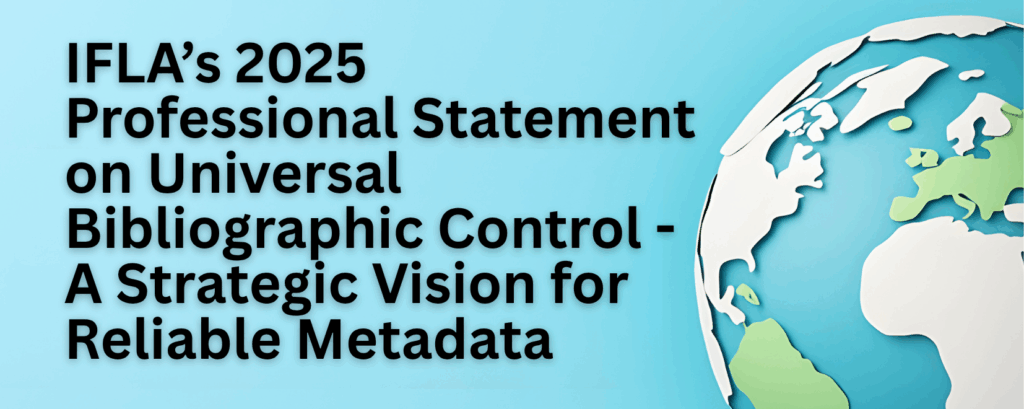Just Released: IFLA’s 2025 Professional Statement on Universal Bibliographic Control – A Strategic Vision for Reliable Metadata
28 July 2025
As technology continues to transform how information is created, shared, and accessed, the vision of global access to authoritative metadata remains more important than ever. The rapid growth of digital content and the increasing complexity of the information landscape demand reliable, standardised, and interoperable metadata. This is essential to ensure trustworthy access to global knowledge. In this context, IFLA is pleased to announce the release of the new Professional Statement on Universal Bibliographic Control (UBC), a strategic, updated reaffirmation of a long-standing commitment to global bibliographic coordination.
Endorsed by IFLA’s Governing Board in July 2025, the new statement updates and replaces the 2012 version. It reasserts the continuing importance of UBC as a foundational principle in the library and information services ecosystem, supporting access to trustworthy information for all.
“Universal Bibliographic Control (UBC) is the concept of achieving global coordination and access to bibliographic and authority metadata through the timely creation and sharing of essential user-oriented bibliographic information.”
While the core mission of UBC remains unchanged, the new statement reflects the current realities of metadata creation, distribution, and use. It articulates strategic goals, foundational principles, and stakeholder responsibilities, all directed towards maintaining authoritative and accessible metadata. UBC serves as the structural backbone for the application of the IFLA suite of bibliographic standards. It provides a coherent framework for national bibliographic agencies and national bibliographies to operate in a coordinated, consistent, and interoperable way.
The Professional Statement on Universal Bibliographic Control (2025) presents a concise yet comprehensive framework for understanding and advancing UBC in today’s world:
- It defines the concept and historical context of UBC,
- It sets out key strategic goals and guiding principles,
- It highlights the broad benefits of UBC for libraries, users, and the wider documentary ecosystem,
- It identifies the roles and responsibilities of major stakeholders,
- And it concludes with a call to action, encouraging collaboration and practical engagement across sectors.
Rather than referencing specific technologies or standards, the statement provides a high-level, enduring vision that can guide implementation across diverse institutional contexts and in evolving metadata environments.
The revision was led by the IFLA Bibliography Section, working closely with the Cataloguing and the Subject Analysis and Access Sections, and the Advisory Committee on Standards. Members of the working group were drawn from these four groups. The IFLA National Libraries Section was also consulted during the process. The revision included global consultation and review, reflecting input from professionals across very diverse regions.
Read the full Professional Statement on Universal Bibliographic Control (2025)
Translations of the Professional Statement on Universal Bibliographic Control into other IFLA official languages will begin shortly and will be made available as soon as possible. If your organisation or association is interested in contributing a translation into another language, please contact us at [email protected], [email protected] and [email protected]. We will be happy to provide you with a template and guidelines to support your efforts.
The Professional Statement on UBC will be presented at these events:
- WLIC 2025 open session 099: Reliable Data, Stronger Libraries: Universal Bibliographic Control for the Future, (9:00-10:15 Tuesday 19 August), sponsored by the Bibliography, Cataloguing, and Subject Analysis and Access Sections, with the Advisory Committee on Standards
- In a webinar in the Topics in National Bibliographies Virtual Event Series (playlist) sponsored by the Bibliography Section (date TBA)
We encourage national bibliographic agencies, libraries, and library and information professionals around the world to engage with the statement and apply its principles in their own contexts.
